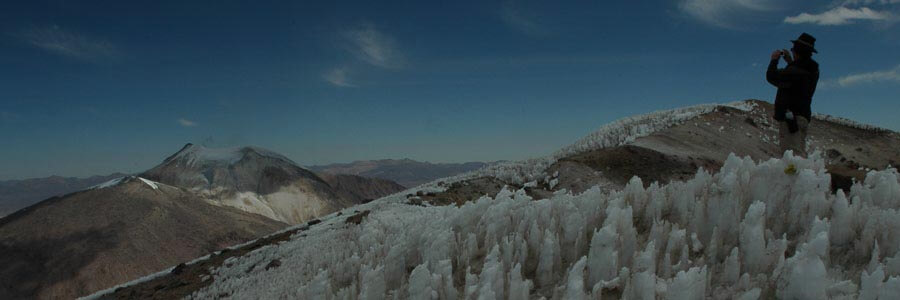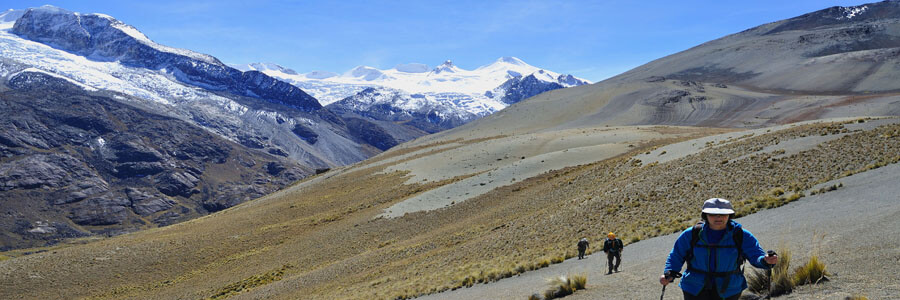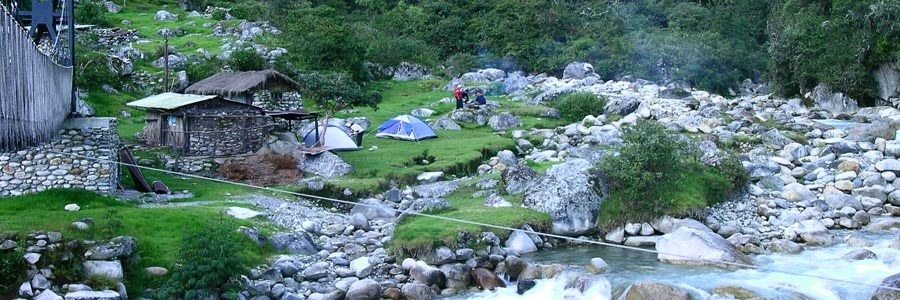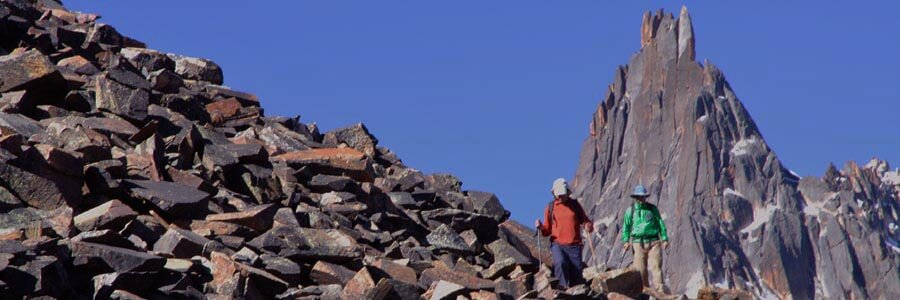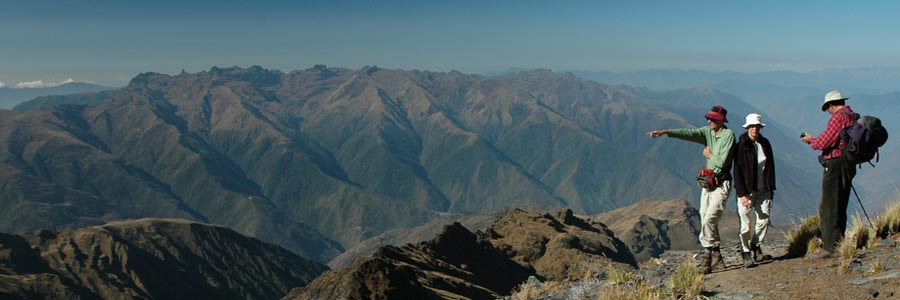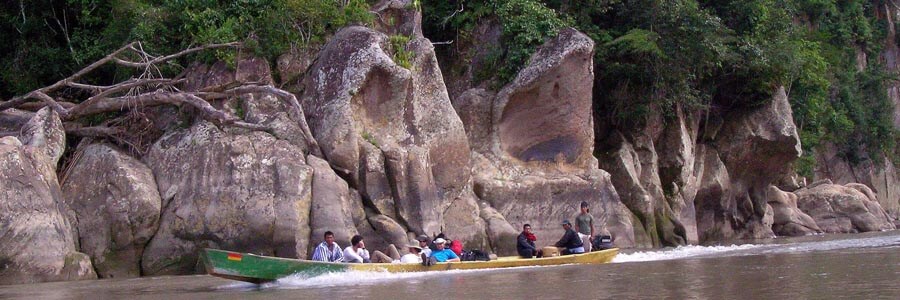Services included in our trips vary in each case but generally we include the following:
| Services Included | Services Not Included |
|---|---|
|
|
Our guide will usually have a briefing with the clients after their arrival to double check the following:
- Last minute changes in the itinerary, weather conditions, and social or political situation.
- Confirmation about the services included and not included.
- Confirmation that all clients have all required equipment/clothing. If needed our guide can help the clients to buy/rent/borrow whatever is missing.
- To provide the clients useful information about the city: dangers, safety, shopping, money exchange houses, restaurants, and other attractions.
- To provide clients tips for a proper acclimatization.
Guides
We strongly believe that the guide is the "corner stone" of any trip, a good guide can be the difference between a wonderful trip or a disastrous one.
The main goal of our guides is to lead the clients through a beautiful and unforgettable experience and that is why we always work with the elite of the qualified guides in the region.
Their wide expertise allow them not only to run a successful and safe trip, but also to give our clientele a deep inside in the culture and history of the country.
On adventurous trips (i.e. overland, trekking, mountaineering, mountain biking, Sea Kayaking), or “special interest” customized trips (i.e. Photography, Archaeology, Bird Watching), we contract highly specialized guides who are experts in their specialty.
As we are not a massive operator, we rather work with small to medium sized groups. This allows us to give our clients a more personalized and catered service that would not be possible in larger groups. Our guide/client ratio is 1 to 7 on trekking and overland trips, 1 to 3 or 1 to 2 on mountaineering (depending of the difficulty of the chosen route).
Our Mountain Guides have been trained and certified by the German Alpine Club (DAV) and/or the National School of Ski and Alpinism of Chamonix (ENSA). Nowadays, we have more than 25 Bolivian mountain guides that have the certification of the International Mountain Guides Association IFMGA/ UIAGM/IVBV. All of them are active members of the Bolivian Mountain Guides Association AGMTB (more information www.agmtb.org).
- An English-speaking guide is normally sent during our programs
- Guide in other languages or no-guide trips can be organized upon request
- On climbing trips we use professional or aspirant mountain guide with international UIAGM/IFMGA certification
Cooks
Some of our cooks have been formally trained in the “outdoor cooking school in Peru” and all of them are well trained
On trekking or climbing trips we always send a cook. An assistant (kitchen boy) in also included with large groups; usually a cook in training
On overland trips based in hotel accommodation, the local guide will make the little cooking required (mostly lunches)
Drivers
Driving in the Andes can be a real adventure in itself. A minor part of the roads are paved and are in optimal conditions, most of the roads on the highlands are dirty and/or in bad shape (specially after the rainy season), the roads down to the Amazon basin are very narrow and slippery, heading to trailheads or the base camps driving over secondary mining or agricultural roads is a real challenge for the most experience drivers.
For all the reasons above we are very selective choosing our drivers. We impose a cero alcohol tolerance with our drivers, unfortunately a very common problem with many other drivers.
Due to the bad conditions of our roads, mechanical incidents may happen on our trips, that is why our drivers have good mechanical skills.
- On all of our trips we always send a driver
- Due to safety reason and because the insurance company prohibit this, clients or tour leaders are not allow driving our vehicles. Trekking or climbing trips we always send a cook
- We invite you to visit the page “Who we are / Staff” in our website to see the list of guides we work with, most of them bilingual and professionals
Transfers
- One transfer per group, extra transfers are organized and quoted separately
- An English-speaking guide porting a welcome sign is always sent for transfers
- Guide in other languages or no-guide transfer can be required upon request
- For safety we suggest to not accept any stranger to carry your bags. If you use one of the freelance porters, a tip of US$ 0.50 per bag is expected
- In the case that a bag does not arrive, the local guide will help the client to make a formal claim
- Clients can change money at the airport but the rate is a bit lower than in the city. Upon request, our guides can take envelopes with Bolivian currency to be changed to the clients using the official exchange rate (typically US$ 20 in Bs)
- If possible we make stops on view-points on the way to the hotel
- On the way out we suggest leaving your hotel 3 hours before to departure time
Hotel accommodation
- We normally use the most charming and charismatic *** hotels based in double room occupancy with continental breakfast included
- Hotel upgrade or single room supplement can be organized upon request
- Most of the hotels check out is about noon and check in after noon. On early arrivals clients may need to wait for the rooms to be ready
- Hotel staff will photocopy clients passports plus the voucher they got when entering in Bolivia
Here is a list of the main hotels we suggest and work with:
La Paz
- Hotel Nayra ***
- Hotel Rey Palace ****
- Apart Hotel Alcala ****
- Hotel Europa *****
Copacabana
- Hotel Rosario del Lago ***
- Hotel Cupula **
Island of the Sun
- La Estancia Eco Lodge
Sorata
- Altai Oasis ***
Coroico
- Sol y Luna **
- La Senda Verde Lodge
Potosi
- Hotel Santa Teresa ***
- Cayara Hotel Museo
Sucre
- Hostal de su Merced ***
Uyuni & Lipez
- Hotel Luna Salada ***
- Hoteles Tayka ***
Land transportation
- We normally use 4WD station wagon vehicles for up to 5 passengers during our trips (Nissan Patrol, Land Rover Defender or Toyota Land Cruiser).
- With large groups and on paved roads we may use buses.
- Before every trip we maintain our vehicles to keep them in optimal conditions, enhancing the safety of our clients and providing them a comfortable trip.
- Clients should double-check the vehicles to make sure they are not leaving any valuables behind.
- Andean Summits do not responsibility over the personal belongings of the clients.
Luggage transportation
- When trekking or approaching to base camps, we transport client's luggage, food, and common camping and climbing equipment with the help of animals or – rarely – porters
- When trekking to high camps we use porters to carry the equipment.
- In order to protect the health of our porters and the animals, we limit the weight they carry up to: 35kg for mules and donkeys, 22kg for llamas and Porters.
- There is a 20kg weight limit per client. An extra charge may apply if a client's luggage overweight this limit.
- Usually porters or muleteers do not take the same route as the group, clients must be aware that their luggage won't be accessible to the end of the day.
- We suggest our clients to pad delicate stuff and put everything in plastic bags within a duffle bag. For safety, it is also suggested to lock the duffle bag with a padlock.
Food
- Full-board-food is provided when traveling overland, trekking or climbing.
- Four meals a day are provided: breakfast, box lunch, tea- time and a two-course dinner (box lunch usually includes some snacks as well).
- Water is always provided on our trips (including restaurants); bottled water is bought for the first days and boiled/filtered water for the remaining days when trekking or climbing.
- We have a varied eclectic menu including: international and typical local dishes. Upon request our cooks can make vegetarian, Vegan or special diet food.
- Lunch and dinner is not included while in main cities, only B&B accommodation. Upon request, we can organize a farewell or welcome dinner for the group.
- Soft drinks (i.e.coke) or spirits (i.e wine, beer) is never included in our meals (of course we always have a bottle of Bolivian wine to share with our clients.
- Distilled organic coffee (Italian style) is provided to our clients during the breakfast when camping.
- To avoid stomach illnesses during the trips, we strongly suggest our clients to never eat anything on streets.
- During our trips our kitchen staff are always careful about hygiene, they wash their hands before preparing every meal and make the dishes with bleach and boiling water.
- Alcohol-gel (Purell type) is always available during the meals, so the clients can clean their hands before eating.
- Our cooks always boil or filter the water we drink and also add some iodine
Camping
- High quality 3-people tents are always provided when camping, one for each 2 clients.
- 3-season tents for trekking and 4- season tents for climbing.
- Single tent supplement can be provided upon request.
- Camping chairs, tables, mess tent, lanterns and kitchen tent are provided when camping (except at high camps where we do not take chairs or tables).
- Toilet tent latrine-type will be available when camping (we do not have toilet tents with roof to avoid odors).
- We do not provide personal camping equipment like: sleeping bags, foam pad or inflatable mattress, and clothing.
- Our staff will organize the campsite and clients do not need to help.
- Clients will be asked to take care of their assigned tent, any damage to the tent (i.e. ripped fabric, problems with zippers) should be reported immediately to the local guide.
- Clients should pack their bags first thing in the morning, so the staff can start putting down the tents while they have breakfast.
- Warm water, soap and a towel will always be available in from of the mess tent before breakfast and dinner.
Climbing equipment
- We provide common equipment like ropes, snow pickets, ice screws, lings, carabiners and other hardware.
- We do not provide personal climbing equipment including: plastic boots, harnesses, ice axe, crampons, helmet, and clothing.
Communication & security
- Our local guides do always have cell phones that work ok in most of the areas we travel (sometimes the guide would require to climb to a higher elevation when in deep valleys for instance).
- FM or UHF walkie talkies for communication between guide or drivers are always sent on our trips.
- For the moment we do not have Satellite phones.
- We always advice our clients that there is no proper rescue system in Bolivia, no helicopters can be called in case of an emergency.
- If required, professional UIAGM/IFMGA guides highly trained in rescue techniques can be called for a rescue in the mountains. Anyways all groups have to be self sufficient, and able to organize their own rescue or evacuation if needed. All expensed as a result of a rescue or evacuation should be paid by the client himself through his/her insurance coverage.
- Our guides will have a small first aid kit including the basic drugs (painkillers, generic antibiotics, and peptic stuff for stomach upsets) and medical material to cure minor wounds. Our guides do not carry, prescribe or administrate drugs like Azetazolamide or Dexametazone.

